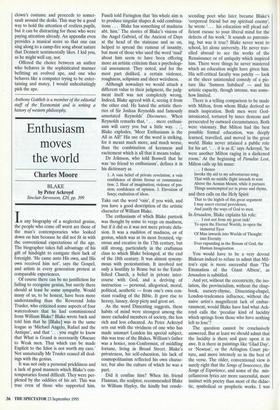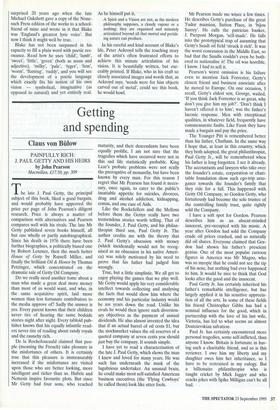Enthusiasm moves the world
Charles Moore
BLAKE by Peter Ackroyd Sinclair-Stevenson, £20, pp. 399 In any biography of a neglected genius, the people who come off worst are those of the man's contemporaries who looked down on him because he did not fit in with the conventional expectations of the age. The biographer takes full advantage of his gift of hindsight to castigate their lack of foresight. 'He came unto His own, and His own received him not', says the Gospel, and artists in every generation protest at comparable experiences.
Of course there can be no justifiction for failing to recognise genius, but surely there should at least be some sympathy. Would many of us, to be honest, have been more understanding than the Reverend John Trusler, who criticised some aspects of four watercolours that he had commissioned from William Blake? Blake wrote back and told him that he [Blake] was in the same league as 'Michael Angelo, Rafael and the Antique', and that . you ought to know that What is Grand is necessarily Obscure to Weak men. That which can be made Explicit to the Idiot is not worth my care.' Not unnaturally Mr Trusler ceased all deal- ings with the genius.
It was not only a personal prickliness and a lack of good manners which Blake's con- temporaries found difficult. They were per- plexed by the oddities of his art. This was true even of those who supported him. Fuseli told Farington that 'his whole aim is to produce singular shapes & odd combina- tions . . . Blake has something of madness abt. him.' The stories of Blake's visions of the Angel Gabriel, of the Ancient of Days at the head of the staircase and so on, helped to spread the rumour of insanity, but most of those who used the word 'mad' about him seem to have been offering more an artistic criticism than a psychologi- cal assessment. They noted, and for the most part disliked, a certain violence, roughness, solipsism and sheer weirdness.
Although nowadays we would attach a different value to their judgment, the judg- ment itself was not completely wrong. Indeed, Blake agreed with it, seeing it from the other end. He hated the artistic theo- ries of Sir Joshua Reynolds and famously annotated Reynolds' Discourses. When Reynolds remarks that, ' . . . mere enthusi- asm will carry you but a little way. . Blake explodes, 'Meer Enthusiasm is the All in All!' His use of the word is striking, for it meant much more, and much worse, than the combination of keenness and excitement which is all that it means today.
Dr Johnson, who told Boswell that he was `no friend to enthusiasm', defines it in his dictionary as
1. A vain belief of private revelation; a vain confidence of divine favour or communica- tion. 2. Heat of imagination; violence of pas- sion; confidence of opinion. 3. Elevation of fancy; exaltation of ideas.
Take out the word 'vain', if you wish, and you have a good description of the artistic character of William Blake.
The enthusiasm of which Blake partook was thought by some to verge on madness, but if it did so it was not mere private delu- sion. It was a tradition of madness, or of genius, which was at its most frenzied, vig- orous and creative in the 17th century, but still strong, particularly in the craftsman class to which Blake belonged, at the end of the 18th century. It was almost synony- mous with protestantism. It involved not only a hostility to Rome but to the Estab- lished Church, a belief in private inter- course with God, and a deriving of instruction — personal, allegorical, moral, political, aesthetic — from one's own con- stant reading of the Bible. It gave rise to heresy, lunacy, deep piety and great art.
As the word Dissenting suggests, these habits of mind were strongest among the more excluded members of society, the less rich and less educated. As Peter Ackroyd sets out with the vividness of one who has made unsmart London his special subject, this was true of the Blakes. William's father was a hosier, non-Conformist, of middling fortune, living in Broad Street. Blake's privateness, his self-education, his lack of cosmopolitanism reflected his own charac- ter, but also the culture of which he was a part.
Did it confine him? When his friend Flaxman, the sculptor, recommended Blake to William Hayley, the kindly but conde- scending poet who later became Blake's `corporeal friend but my spiritual enemy', he wrote . his education will plead suf- ficient excuse to your liberal mind for the defects of his work.' It sounds so patronis- ing, but was it true? Blake never went to school, let alone university. He never trav- elled abroad to see the works of the Renaissance or of antiquity which inspired him. There were things he never 'mastered which an education might have given him. His self-critical faculty was patchy — look at the sheer unintended comedy of a pic- ture like 'Samson Subdued' — and his artistic capacity, though intense, was some- how limited.
There is a telling comparison to be made with Milton, from whom Blake derived so much inspiration. Both men were God- intoxicated, tortured by inner demons and persecuted by outward circumstances. Both were visionary. But Milton had the best possible formal education, was deeply learned, travelled, and moved in the great world. Blake never attained a public role for his art. . it is as if,' says Ackroyd, 'he were another Milton raging in a darkened room.' At the beginning of Paradise Lost, Milton calls up his muse: . I thence
Invoke thy aid to my adventurous song. That with no middle flight intends to soar Above the Aonian Mount, while it pursues Things unattempted yet in prose and rhyme,
and then calls on the Holy Spirit
That to the highth of this great argument I may assert eternal providence, And justify the ways of God to men.
In Jerusalem, Blake explains his role: . I rest not from my great task!
To open the Eternal Worlds, to open the immortal Eyes Of Man inwards into Worlds of Thought: into Eternity Ever expanding in the Bosom of God, the Human Imagination.
You would have to be a very devout Blakean indeed to refuse to admit that Mil- ton's epic is more successful than The Emanation of the Giant Albion', as Jerusalem is subtitled.
And yet, without the eccentricity, the iso- lation, the provincialism, without the chap- book, nursery-rhyme, Dissenting-chapel, London-tradesmen influence, without the naive artist's magnificent lack of embar- rassment, would Blake have had what Ack- royd calls the 'peculiar kind of lucidity which springs from those who have nothing left to lose'?
The question cannot be conclusively answered. But at least we should admit that the lucidity is there and gaze upon it in awe. It is there in paintings like 'Glad Day', or 'Newton', or the Arlington Court pic- ture, and more intensely so in the best of the verse. The older, conventional view is surely right that the Songs of Innocence, the Songs of Experience, and some of the mis- cellaneous lyrics are more successful, more instinct with poetry than most of the didac- tic, symbolical or prophetic works. I was surprised 20 years ago when the late Michael Oakshott gave a copy of the None- such Press edition of the works to a school- friend of mine and wrote in it that Blake was 'England's greatest lyric voice'. But now I think it might well be true.
Blake has not been surpassed in his capacity to fill a plain word with poetic res- onance. Read how he uses 'child', 'lamb', `sweet', 'little', 'green' (both as noun and adjective), 'milky', 'pale', `tyger', 'lion', `worm', 'flaming', 'ruddy', and you will see the development of a poetic language which exactly fits his notion of his own vision — symbolical, imaginative (as opposed to natural) and yet entirely real. As he himself put it,
A Spirit and a Vision are not, as the modem philosophy supposes, a cloudy vapour or a nothing: they are organised and minutely articulated beyond all that mortal and perish- ing nature can produce.
In his careful and kind account of Blake's life, Peter Ackroyd tells the touching story of the artist's often frustrated efforts to achieve this minute articulation of his vision. It is beautifully written, but exe- crably printed. If Blake, who in his craft so closely associated images and words that, as Ackroyd says, 'words were for him objects carved out of metal', could see this book, he would howl.



































































 Previous page
Previous page